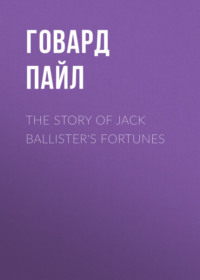 полная версия
полная версияRejected of Men
“Why, of course He is,” said he.
He had seen no miracle and could see none. How was it possible for a sadducee, who believed in no resurrection, to see a miracle? The wisest sadducee that ever lived, had he seen a miracle, would not have believed it. Had the Almighty blotted out the sun and the moon and written the sign of His Truth in letters of fire all across the blackened canopy of the heavens, Redfern or Corry King would not have believed–they would have misdoubted their own eyesight.
After they had satisfied their curiosity, the party went back to the boat and played poker until nearly two o’clock in the morning.
VI
THE YOUNG MAN WITH GREAT POSSESSIONS
DR. AND MRS. CAIAPHAS were spending the latter part of the summer at the sea-side with their son-in-law, Mr. Henry Herbert Gilderman.
Mrs. Gilderman was Dr. and Mrs. Caiaphas’s daughter Florence–their eldest girl, and perhaps the best-beloved by the doctor of all the children. She had been married now a little over a year, during nearly all of which time she and her husband had lived abroad.
Gilderman was one of the richest men in the world. His grandfather had laid the foundation of that great Gilderman estate of the present generation, and his father had built well upon the foundation that the first Gilderman had laid. Gilderman had been born into all this great wealth–so great that, perhaps, no man could realize how vast it was. To be born into such a fortune is almost as to be born into royalty. It shuts the inheritor into a shell of circumstances from which there is no escape. Such a man as Gilderman must live his life after a certain routine and in a certain way from which there is no escape. There was no privacy in his life, for all the world looked on and saw what he did. His business of life was to spend money and to enjoy himself. For that purpose, and for that purpose alone, he was born into the world. He had a house in the metropolis, another at the nation’s capital, and still another where the Romans of his class spent the torrid weather of summer. Each of these was a palace, and each was filled with gems of art and rare pieces of china, plate, tapestries, and bric-à-brac that his agents had collected for him from all parts of the world. He had given a hundred and sixty thousand dollars for a single painting, and after it was hung he had, perhaps, hardly looked at it. When he travelled he had a valet to look after him, and to foresee and to fulfil his wishes. He hardly did anything for himself–not even to order a cab or to purchase a railroad-ticket. Other attendants looked after the heaps of luggage which he took with him when he travelled. He had his avant-courier to prepare soft places for him in which to lodge, and others remained behind to close the places which he left. Now that he was married, his wife–who had fallen very pliantly into her new life, as women do–must also have a maid to accompany her wherever she went. They would almost fill the private car in which they nearly always travelled if they had any distance to go, especially if they travelled upon any of the railroads which Gilderman controlled. There was no escape from this routine. Even when Gilderman would seek to change the monotonous smoothness of his existence with a taste of something rougher–say of the mountains–it was only a pretended roughness covering over the same perpetual smoothness and softness of life. His log-hut in the wilderness was a palace masquerading as a hut of logs. Everything was really soft and warm; the furniture was an artificial reproduction of something rough; the floors were spread with skins of wild beasts that cost three or four or five hundred dollars apiece; there was an open fireplace that was designed and built by Marcy, the architect, and a picture of this pretence of roughness was published in the voluminous Sunday issue of some daily paper for all the world to behold.
Such were the surroundings of Henry Herbert Gilderman. Into these circumstances the mysterious paradox of divine wisdom had placed a selfhood, eager, alertly intelligent, receptive, warm, affectionate. A nature which, perhaps, lacked the gritty strenuosity in which a character grows strong and fibrous and hard, but a nature soft, rich, and lovable–a nature into which the seeds of truth fell easily and struck quick roots and thrust forth a rapid growth. The garden of his soul was rather luxuriant than well tilled, but it was fruitful and beautiful.
As said before, the business of Gilderman’s life was its enjoyments–and the spending of money; the dream of his life was of religious faith, of social reform, of an equitable readjustment of the classes. He read intermittently of advanced socialistic and theological literature. In these readings he would soon grow tired, presently find himself becoming dull and drowsy; but each time he read a few seeds would fall scatteringly in the soft, warm loam of his soul, and would there spring up into the quick, rank growth of which he was very proud.
He loved nothing better than to talk to some intimate friend of his dreams and of his religious and socialistic views. He would talk on such an occasion until his cheeks glowed and his breath came hot and thick. He would, sometimes, afterwards wonder dimly whether he had not been a little foolish–whether he had not talked too much and said too much nonsense. But he enjoyed the intensity of the excitement while it lasted.
His friends loved him.
He was, unless crossed in his desires, kind to every one whom he met; but he never forgot that he was Henry Herbert Gilderman and the grandson of James Quincy Gilderman.
Gilderman was singularly attracted by the popular interest that centred about John the Baptist, and now about the Christ who taught and healed the poor. He used to talk about these things to his father-in-law when he could get Dr. Caiaphas to discuss the matter. The subject was one not very pleasant to the rector of the Church of the Advent, and he was not often willing to discuss it.
When September arrived, Mrs. Caiaphas did not immediately return to town. Mrs. Gilderman was not at that time feeling at all well, and her mother continued with her for a while. Dr. Caiaphas, however, used to go down on a Saturday morning–generally in Gilderman’s yacht–preach on Sunday, attend to his more pressing parish work on Monday and possibly on Tuesday, and then return directly to his summer home again.
One day Gilderman went down to the metropolis with his father-in-law, having business in town with his manager. They started late in the afternoon, and took their dinner aboard the yacht, which they had to themselves. They sat smoking on the deck after dinner, each in a great rattan chair. The day had been very hot, and they enjoyed to the full the swift motion and the chill of the night air. It was a beautiful night, soft and mild–the sky dusted over with a myriad stars. The yacht sped forward, with a ceaseless rushing of the water alongside. The cigar-points alternately glowed and paled as they smoked. Dr. Caiaphas buttoned up his coat close to his chin. Every now and then the voice of the sailors forward broke the stillness of the night, or the clinking of dishes and tumblers sounded loud as the steward put away the glass and the china in the saloon.
There was a distant light over across the dark water. It led Gilderman’s thoughts to the subject which had occupied them much of late.
“By-the-way,” he said, “has it never occurred to you, sir, to question whether, after all, the Messiah whom the people are proclaiming over yonder is not really the Divine Truth incarnated?”
“No,” said Dr. Caiaphas, “it has not. And, to tell you the truth, Henry, I would a great deal rather not discuss that phase of the question.”
“Why not?”
“Well, because it is unpleasant to me–because it is distressful to me.” Gilderman was silent, and, by-and-by, Dr. Caiaphas voluntarily continued: “The Divine Word leads us to understand that God is a spirit, and they that worship Him must worship Him in spirit and in truth. It is revolting to me to even listen to the supposition that the God of Heaven could have a human son–a carpenter by trade–and that the mother should be the wife of a common carpenter.”
“I think I enter perfectly into your feelings,” said Gilderman, after another little space of silence; “but–I don’t want to force the conversation upon you, you understand, sir–but I must say that it seems to me that you think only of God’s acting according to your own ideas of fitness. I do not believe that He ever acts according to man’s ideas, and maybe He may not have done so in this instance. How do you know, sir, that we may not be mistaken? And, if we are mistaken, what a great wrong are we doing!”
“In that case,” said Dr. Caiaphas, “and, if I am mistaken, speaking for myself, I see nothing for it but to suffer for my own short-sightedness. Every man must exercise his own judgment, and if his judgment is wrong he must suffer for it. I cannot believe that this poor journeyman carpenter is the son of the Almighty God whom I worship. If I am mistaken, I must suffer for it, for I cannot change my mind. And I am so sure in my disbelief,” he added, as though to close the discussion, “that I am willing to stand my chances upon it at the day of judgment, even if that day were to-morrow.”
After that, Gilderman did not say anything more. But in the few words he had said he had begun almost to convince himself that the miracles of which the world was beginning to talk were really worthy of attention.
The next morning, after an eleven-o’clock breakfast aboard the yacht, Gilderman had himself driven down to his office. After the freshness of the open air at the sea-side, the city felt like a steaming oven. Gilderman sat leaning back in the brougham smoking and looking out upon the hot bustle of the street. The ceaselessly streaming crowds on the sidewalk hurried and jostled and pushed, paying no attention to the heat or to their fellow-men or to heaven or to hell, or to anything but the business they were just then so intent upon–each man a little life in himself shut out from all the other little lives around him.
A bulletin was posted on a board in front of a newspaper-office–a square of brownish paper covered with ink-drawn characters. Half a dozen men stood looking at it, but the stream of humanity flowed by, neither thinking of nor caring for the words posted above their heads.
In large letters it proclaimed that John the Baptist had been executed the night before.
It brought a singular shock to Gilderman, who was still impressed by the recollection of the brief talk that he had had with his father-in-law. He said to himself, as he sat leaning back in the carriage, “It’s a confounded shame!”
He thought about it intermittently all the way down to the office and until the brougham stopped at the sidewalk and he got out.
The office was on the first floor of an imposing brown-stone building. Over the great, glazed doors were carved in relief the words:
“Gilderman Building.”On both sides of the plate-glass windows that looked out into the busy street were gilt letters:
“Office of the Gilderman Estate.”Now the windows were open, and through them he could see the clerks busy over the books. They looked warm, and wore linen or madras jackets. Mr. Wright, the manager, was standing with the cashier looking over a book. They neither of them saw him.
“You may come for me at three o’clock,” Gilderman said to the man, who stood holding open the door of the brougham. And then he turned and went up the steps and through the swinging-door. The electric-fans were whirring, and the air felt cool after the hot street outside.
He went directly through to the manager’s room beyond. Those whom he passed turned and looked after him; he was used to having men look after him in that way. He felt that the fact of his presence became almost instantly known throughout the entire office. There was a silent, indescribable movement among the clerks. He saw the cashier speak to Mr. Wright, the manager, who looked up sharply.
Gilderman went directly into his private office. He laid his hat on the table among the newspapers. There was a brass electric-fan on the mantel, and he turned the switch and started it moving, standing before the refreshing coolness. As he did so the other door opened and Mr. Wright came in. The manager bowed and Gilderman acknowledged his presence with a nod. He did not move away from the cooling breezes of the fan.
“I am sorry to have called you away from the sea in such weather as this, Mr. Gilderman,” said the manager.
“I’m sorry to come, Wright. It seems to me we’ve had nothing but hot weather ever since February.”
“How’s Mrs. Gilderman?” asked the manager.
“Not very well,” said Gilderman, briefly. “I suppose you wanted me about those copper-mines?”
“Yes, sir; the transfers will have to be signed this week. I’ve made arrangements with Mr. Pengrist and Walton, of Walton & Boone, to be here. Shall I send word to Mr. Pengrist now?”
“You might as well,” said Mr. Gilderman. As Mr. Wright touched the electric-bell he remembered the bulletin he had just seen posted at the newspaper office. “By-the-way,” said he, “I saw it posted on the bulletin-board as I came down that John the Baptist had been executed.”
“Yes; so I was told awhile ago,” said Mr. Wright. “I think it’s a pity that there should have been any dilly-dallying about it. Herod might as well have acted sharply in the first instance. He has gained nothing by all this delay.”
“I don’t think the Baptist ought to have been executed at all,” said Gilderman, briefly.
Mr. Wright smiled, and then looked quickly sober. He had for the moment forgotten Gilderman’s radical and socialistic proclivities. He thought that they were very foolish, but he was too practical a man and had too much good sense to argue the point.
The messenger-boy appeared at the open door. “Go down to Pengrist & Ball’s,” said Mr. Wright, “and tell Mr. Pengrist that Mr. Gilderman is here.”
“Yes, sir,” said the boy and disappeared.
VII
AMONG THE ROMANS
GILDERMAN had made an appointment by note to dine that evening at the “Romans” with his friend Stirling West. His father-in-law had asked him to dine at the rectory, but he had declined. The truth was, that he was hungering for a taste of that sort of masculine society which he could only find at the club.
The “Romans” was a pseudonym for the International Club. Why it was so called can better be understood than explained. The International Club, though large, was really one of the most select clubs in the metropolis. Its membership was almost entirely composed of plutocrats. With these was a sprinkling intermixture of the politicratic class. The chief ruler of the nation was an honorary member; Governor Pilate was a member, and so were others among the rulers of the nation. But almost the entire body of the club was composed of plutocrats–such men as Mr. Dorman-Webster among the patriarchs, and Gilderman among the juniors.
The club was always pretty full at this time of the year. Wives and families were yet out of town, and the men came here to dine. Gilderman went early and secured a table by the open window, and sat there reading while he waited for his friend to come. The breeze came in at the open windows every now and then, swaying and bellying the gaudy awning outside. The stony street below looked hot and empty in the sloping light of the sinking sun. Every now and then Gilderman looked around from his paper–the room was beginning to fill. There was a distinct air of informality about everything. Many of the men wore tweed suits.
At last, Stirling West sauntered into the room and dropped into his place. “How d’e do, old man?” said he. “Beastly hot, isn’t it? How did you leave the madam?”
“Not very well–her mother’s with her.”
“So I heard. By-the-way, I see his reverence is at the rectory.”
“Yes; he came down last night in the Nautilus. Have a cocktail?”
The dinner was over and they were sitting in the café. Gilderman had been talking to his friend concerning his religious views. He had been led into that current of talk from discussing the execution of John the Baptist.
“By Jove! old man,” said Stirling West, “I wish I had your enthusiasm–I do, indeed. I believe you really believe in all that sort of stuff you’re talking to me about.”
The air about them was blue with tobacco smoke. Their coffee-cups at their elbows were empty, except for a black remainder at the bottom; the saucers half full of the scattered cigar-ashes that had been tilted into them.
Gilderman recognized that his talk was out of place, but he still continued. “Why do you call it stuff, Stirling? It’s only stuff to you because you don’t believe in it. The future life in another world is as real to me as–as going out of this café into the smoking-room yonder. What is life without such a belief as that? If you regard this life as all that there is for a man to live, then the world is a pit of misery worse than hell, and God is a jesting devil juggling with the misery and the pangs of mankind whom He created for His own amusement. Just look at it, Stirling, in the light of reason. Here we are with more than we want, trying to tickle our stomachs into an appetite by all this made-up stuff we’ve been eating. Go only just around the corner yonder and you’ll find men and women living like maggots.”
“Oh yes; I know all about that sort of socialistic rot,” put in Stirling West. “But how the deuce am I to help it, old man? I didn’t put ’em there, and I can’t go nosing around in their beastly tenements. What’s the use of thinking and worrying about it, anyhow? What’s the use of stirring up all that sort of a row about a thing a man can’t help?”
“But, don’t you see,” cried Gilderman, enthusiastically, stretching out his hand across the table and opening it tensely, “if this life’s only the first step in a man’s existence, how beautifully all the inequality and the injustice of the world is made equal and orderly in view of the world to come. We are all passing through a little state of probation. What does it matter if a man is rich or poor for these few short years of life?”
“By Jove! it matters a deuced deal, I can tell you,” said Stirling West. “Look here, Gildy, you don’t know, and nobody knows, that he has a life to live after he’s dead.”
“Yes, I do,” said Gilderman; “I know it as well as I know that I’m alive now.” But even as he spoke he knew that there were moments when he doubted it.
“No; you don’t know it. You believe it, but you don’t know it. Well, old man, a bird in the hand’s worth two in the bush, any day. My life’s a bird in the hand–it’s a lark, you know–and I’m going to get all the fun out of it there is in it. I’m dead sure I’m alive now, and I’m not sure of what is to come after I’m dead. You may bet your life I’m not going to throw away my present chances for something I don’t know about.”
Gilderman paused for a little while. “Oh, well,” he said, presently, “it doesn’t matter. If God don’t want you to see the truth, you can’t see it, and no man can make you see it. He has His own divine way of regenerating every man. I believe–you don’t believe; I see–you don’t see. It is neither to my credit nor to your discredit. It is simply that we’re made as we are.” A sudden chill of doubt came over him even as he spoke. Such a chill of doubt often struck across his spirit even when he was in the very heat of his enthusiasm. And then again it occurred to him how absurd and out of place it was for him to be discussing such things in the café of the International Club, in the midst of the smoking, the empty coffee-cups, and the humming undertone of masculine talking.
Stirling West sat smoking in meditative silence for a while. By-and-by he suddenly spoke again. “By-the-way,” he said, “have you seen Olivia Carrington yet?”
Olivia Carrington was a notable concert-hall dancer who had just been imported into the country. Gilderman had thought that his companion had been meditating upon what they had been saying. The sudden change of topic made him feel still more the absurdity of his late enthusiasm. “No, I haven’t seen her,” he said.
“By Jove, she’s a daisy! What do you say to go around to the Westminster and see her this evening?”
“I don’t know. All right, I’ll go with you.”
They pushed back their chairs and arose. Gilderman realized very thoroughly what an egregious fool he had been.
They went out into the smoking-room. A group of men were clustered at the great, wide window that looked out upon the street below. Some of the men were standing, some were sitting. Among them was Pontius Pilate. He looked up at Gilderman as he drew near. He was a large, rather fat, smooth-faced man. His skin was colorless and sallow. He had a high, bald forehead, closely cropped gray hair, a hooked nose, and keen, gray eyes deep set under straight, hard brows. His face was square, and his mouth was set in a singular impassivity of expression. His whole face wore the same air of impassive calm–it was like a mask that covered the life within. He looked rather than spoke recognition as Gilderman approached.
Gilderman drew near. The man who was talking was one Latimer-Moire. He had just returned from an automobile expedition, during which he had come into touch with the marvellous works that were afterwards to stir the whole world into a religious belief. He was telling the others how the divine miracles of Christ appeared to a young Roman who, like himself, looked down upon them from the pinnacle of his earthly station.
“… And, by Jove! I tell you what it is,” he said, “you fellows have no idea of all the crazy hurrah those poor devils are kicking up down there. I wouldn’t have believed it if I hadn’t seen it. You can’t even get a decent meal anywhere for the crowds of people everywhere who eat up everything. You can’t go anywhere but you hear of the Man and His miracles. It wasn’t till we got to that place, though, that we struck the worst of it all. The town was full of people–a beastly crowd.
“Well, nothing would do Tommy Ryan but he must see one of those miracles they’re all talking about. So we put up at the hotel, and got some one to show us where He was to be found. Tommy’s man went along with us, and it was a good thing we took him, for when we got near the house, there was the street all packed and jammed with the crowd. It seemed there was a delegation of preachers and elders or something, who had come to interview Him and get Him to do something. Tommy was all for seeing what they were at. So his man, and another fellow he tipped, pushed a way for us through the crowd, and we managed to get into the house. We contrived to edge our way along the entry until we came to a room where He and the ministers were. The place was packed so that we could hardly see anything. Hot? Well, rather! And so close that we could hardly draw a breath. As for the smell–you could cut it with a knife–I thought of all kinds of things you might catch and be sick.
“The ministers and their people were as dead in earnest as though their lives depended upon it. What they wanted was for Him to show them a miracle. As for Him, He just sat there and never made a motion. ‘Show us a sign,’says one of the ministers. ‘If you are, indeed, the Christ, show us a sign.’‘A wicked and adulterous generation,’ said He, ‘ask for a sign, but there shall be no sign given them but the sign of the prophet Jonah.’”
“What did He mean by that?” said young Palliser.
Everybody laughed, and even Governor Pilate smiled.
“But what in the deuce did He mean?” insisted Palliser.
“Mean?” said Latimer-Moire. “How should I know what He meant?”
“What did He look like?” asked Gilderman.
“Look like? Oh, I don’t know; just like any other man. Well, after we had come out of the place, we saw some of His people outside–His mother and His brothers. His brothers had come to look after Him. I felt deucedly sorry for ’em–decent, respectable-looking people enough.”
“By-the-way,” said Sprague, “did you read about His feeding all those people?”
“Oh yes,” said Latimer-Moire; “they were all talking about it down there.”
“Hullo, Stirling,” said a young man who had just that moment joined the group. “How about Olivia Carrington? Are you going to see her to-night?”
West laughed. “Yes,” he said, “I’m going to take Gildy to see her.”











